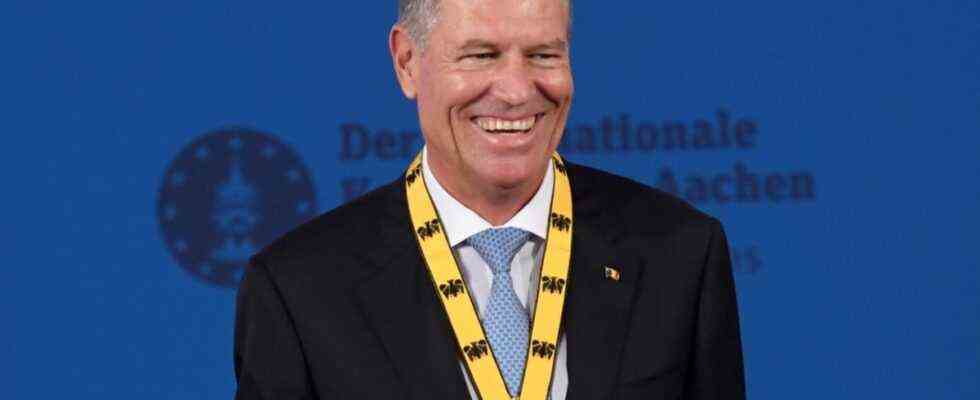Klaus Iohannis is considered to be a rather hypothermic type. Romania’s President is a tall man who usually comes across as a bit angular – and whose powerful head likes to think abstractly. Just like on Saturday lunchtime under the high, almost 700-year-old vaulted ceiling of the coronation hall of Aachen City Hall: From almost each of the 21 pages of his speech manuscript, this year’s Charlemagne Prize winner reads principles that define Europe for him: democracy and the rule of law, market economy and human rights, Unity and solidarity.
But Iohannis can also do other things. For example, when the mayor of Aachen, Sibylle Keupen, gave him the gold medal at the ceremony. Or when ex-Mayor Jürgen Linden honored the native Transylvanian Saxony as “a bridge builder between East and West”. This 62-year-old cold-blooded horse shines like a little boy, his face shines in the spotlight: “Thank you!”
Iohannis spoke in German. And he uses his brittle talk about “a solid and sustainable structure” called the EU for some teasing. The Romanian complains that the citizens of his country – although they have been “a de facto member of the Schengen area” for ten years – are still being checked when entering other EU countries. And Iohannis warns, without saying so drastically, against a two-class Europe: “The true power of the Union”, he tells his German hosts, is “not given by concentric circles or different speeds”. Iohannis is applauded for this, even if not from all: Ten meters to the right of him is Bundestag President Wolfgang Schäuble, who already recommended a “core Europe” in 1994 in order to advance the EU. The CDU politician does not move a hand, looks grumpy to the side.
The Aachen Charlemagne Prize Board wanted to honor the good Eastern European Union with Iohannis. Someone who, unlike Poland’s strong man Jaroslaw Kaczynski or Hungary’s Prime Minister Victor Orbán, stubbornly defends principles: the rule of law, democracy, human rights. For the laudation at the evening dinner, the Slovak President Zuzana Čaputová traveled to Aachen, as a former environmental activist, also Europhoric (sic) and principled: “Our societies must be intolerant of intolerance,” she said.
In a dispute with the right-wing populist Orbán, Iohannis also allowed himself to be carried away in the spring of last year into a polemic that the Hungarian minority in Romania found offensive. Even Romania’s Anti-Discrimination Council sniffed at the President. That was forgotten on this Saturday in Aachen. The conflict only flared up briefly the day before, at a meeting of the “Karlpreis Forum”. When asked about an EU-friendly way of dealing with Orbán, Iohannis just smiled. There would be someone like that in every family, something like a “cousin who fouls up every five minutes.” Then you have to “talk things up,” but: “I don’t believe in throwing it out.”
Laschet probes far from home
Incidentally, one of them did not even come to the Aachen ceremony. North Rhine-Westphalia’s Armin Laschet, long-time member of the Charlemagne Prize Board, canceled at short notice. The CDU boss set other dates across Europe: On Friday evening, the Aachener celebrated the 80th birthday of Bavaria’s former head of government Edmund Stoiber with many Union greats in Munich. On Saturday Laschet traveled to Halle to celebrate German unity with Angela Merkel, who is still Chancellor. From Aachen’s point of view, one could say: Laschet is exploring far from home in order to somehow crown his pan-European imperial city as a city of chancellor. The Charlemagne Prize would then be safe for him.

